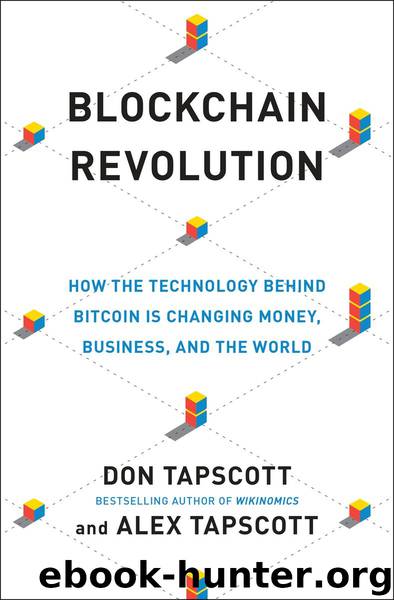Blockchain Revolution (updated) by Don Tapscott & Alex Tapscott

Author:Don Tapscott & Alex Tapscott [Tapscott, Don & Tapscott, Alex]
Language: eng
Format: epub
ISBN: 9781101980132
Publisher: Penguin Publishing Group
Published: 2016-05-10T04:30:00+00:00
Prosperity Purgatory: An Exercise in Futility
For centuries, banks have relied on network effects. Each successive customer, branch, product, dollar in, and dollar out increases the value of the bank’s network. However, building these networks has come at a cost. Specifically, the cost of acquiring a profit-turning customer has only increased. If a prospect’s money won’t earn its keep, the bank won’t be interested in keeping it. Thus, banks have little economic incentive to win customers in the bottom half of the pyramid. According to Tyler Winklevoss, banks don’t serve most of the world and have no existing plans to serve them. However, new technology could remove that step. He said, “A lot of African countries leapfrogged the infrastructure of landline telecoms with cellular. They skipped that step. Blockchain will have the greatest impact in areas where the payment networks don’t exist or are very poor.”20 Blockchain will push many nascent initiatives, such as mobile-money service providers like M-Pesa in Kenya, owned by Safaricom, and microcredit outfits globally, into high gear by making them open, global, and lightning fast.
A bank is the most common financial institution, and so we will use it as an example here. How do you open a bank account? If you live in the developing world today, you will likely have to visit the branch in person. In Nicaragua, there are only 7 bank branches per 100,000 people compared with 34 per 100,000 in the United States. Nicaragua looks well banked compared with many countries in Africa, where there can be fewer than 2 branches per 100,000 people.21 So you will probably have to travel a good distance to find a bank. You will also need to bring a government-issued identity card, but that will be just as difficult to come by if you don’t already have one.
In the developed world—say, the United States—you need to meet certain requirements. While these requirements vary from bank to bank and state to state, you typically need to deposit and maintain a $100 to $500 minimum balance. You also need to prove your identity. Banks that do business in the States must comply with stringent “know your customer,” “anti–money laundering,” and “anti–terrorism financing” regulations.22 And so they must do more comprehensive background checks on applicants before granting them an account. Ultimately, the bank is less interested in evaluating your character than it is in complying with regulatory agencies. That means a laundry list of requirements. First, you need a Social Security card. Don’t have one? That’s usually enough to get rejected. How about a photo ID like a driver’s license or passport? Don’t have one? You’re not opening a bank account. Let’s say you have both a Social Security card and photo ID. The bank, just to be safe, asks for a recent utility bill as proof of permanent residence or some proof of a previous bank account. If you happen to be new to town, or staying with family, or from an entirely unbanked region of the world, you’d likely fail some of these tests.
Download
This site does not store any files on its server. We only index and link to content provided by other sites. Please contact the content providers to delete copyright contents if any and email us, we'll remove relevant links or contents immediately.
| Antennas | Microwaves |
| Mobile & Wireless | Networks |
| Radar | Radio |
| Remote Sensing & GIS | Satellite |
| Signal Processing | Telephone Systems |
| Television & Video |
Whiskies Galore by Ian Buxton(41964)
Introduction to Aircraft Design (Cambridge Aerospace Series) by John P. Fielding(33102)
Small Unmanned Fixed-wing Aircraft Design by Andrew J. Keane Andras Sobester James P. Scanlan & András Sóbester & James P. Scanlan(32776)
Craft Beer for the Homebrewer by Michael Agnew(18218)
Turbulence by E. J. Noyes(8001)
The Complete Stick Figure Physics Tutorials by Allen Sarah(7349)
Kaplan MCAT General Chemistry Review by Kaplan(6913)
The Thirst by Nesbo Jo(6906)
Bad Blood by John Carreyrou(6599)
Modelling of Convective Heat and Mass Transfer in Rotating Flows by Igor V. Shevchuk(6420)
Learning SQL by Alan Beaulieu(6262)
Weapons of Math Destruction by Cathy O'Neil(6248)
Man-made Catastrophes and Risk Information Concealment by Dmitry Chernov & Didier Sornette(5979)
Digital Minimalism by Cal Newport;(5735)
Life 3.0: Being Human in the Age of Artificial Intelligence by Tegmark Max(5532)
iGen by Jean M. Twenge(5398)
Secrets of Antigravity Propulsion: Tesla, UFOs, and Classified Aerospace Technology by Ph.D. Paul A. Laviolette(5356)
Design of Trajectory Optimization Approach for Space Maneuver Vehicle Skip Entry Problems by Runqi Chai & Al Savvaris & Antonios Tsourdos & Senchun Chai(5052)
Pale Blue Dot by Carl Sagan(4981)
